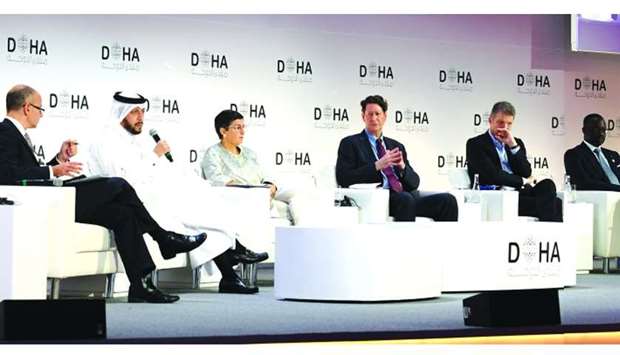The Qatar Investment Authority (QIA) said on Sunday as much as 44% of its investments in the infrastructure projects have zero emission, indicating its commitment to positively impact the communities in which it has deployed funds.
Highlighting the investment opportunities for sovereign wealth funds in projects and areas that target positive social and economic impact, QIA chief executive Mansoor bin Ebrahim al-Mahmoud told Doha Forum 2019 that it has been deploying funds into several companies that are investing in this field and “we are trying to create strategic relations with them.”
In this regard, he highlighted QIA’s recent engagement with global automobile manufacturer Volkswagen.
On Saturday, it has signed ‘Project Qatar Mobility’ wherein the goal is to develop a ground-breaking autonomous transport project and transform the future of urban mobility to a sustainable and commercial deployment of AD (Autonomous Intelligent Driving) shuttles and bus services – even beyond 2022.
The QIA and Volkswagen will work together to develop the required physical and digital infrastructure to seamlessly integrate a fleet of self-driving vehicles into Doha’s existing public transport network.
The landmark project will create a holistic ecosystem for autonomous driving, including the creation of an appropriate legal framework, smart city infrastructure and transfer of knowledge, which can be used as a blueprint to transform urban mobility, both in Qatar and beyond.
"I think these sorts of initiatives are very important that we as a sovereign wealth fund deploy funds locally and internationally for bringing positive impact to the communities," al-Mahmoud said.
Finding that investment opportunities that target positive social and environmental impact are growing; he said there are visible opportunities now since technologies are proven and there are track records and decent returns from these projects.
International Trade Center executive director Arancha Gonzalez said the motive should be “profit with measurable benefits beyond profits”, as has been enshrined in the UN sustainable goals.
Deutsche Bank chief executive Christian Sewing said the global financial crisis has shown the world that banks had gone “too far away” from the society and that it is now time for them to be in the middle of the society.
Referring to its general assembly meetings where shareholders are increasingly questioning the board and management’s strategies on sustainable financing; he said almost 20% of the questions are centered on what steps being taken by the bank for carbon neutral and which sector it ought not to finance.
“I think we have to far more listen to the society and to our clients,” he said.
The other panelists were Andre Swiger, senior vice president ExxonMobil, and Tidjane Thiam, chief executive of Credit Suisse.


